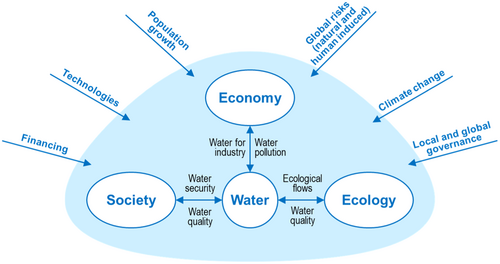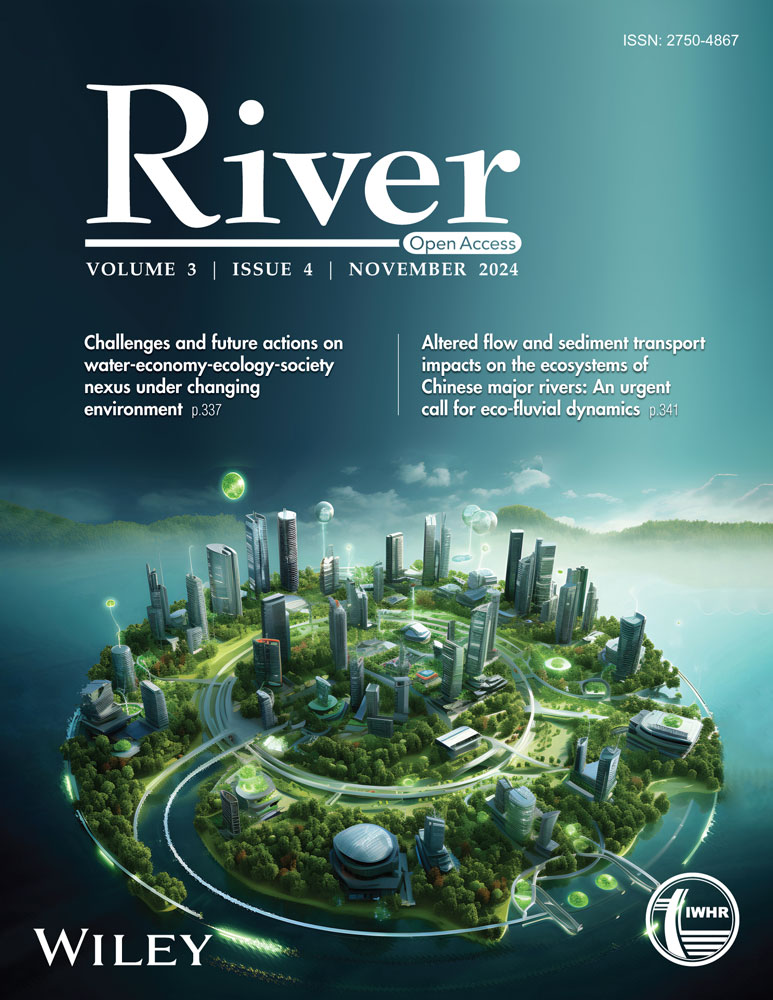Challenges and future actions on water-economy-ecology-society nexus under changing environment
Water, economy, and ecology are interdependent and should be viewed as an interconnected “system of systems” (Daher et al., 2019; Dargin et al., 2019). Water is placed at the center of this complex nexus, being essential for human survival, economic growth, food security, and ecological integrity. Any disruption in the water domain reverberates across multiple other domains, amplifying existing challenges and creating new ones. Consequently, water management and governance carry significant economic and environmental implications that must be addressed through a holistic, integrated approach.
Previous studies highlight the connections among water, economy, and ecology affect numerous societal challenges, including urban-driven water scarcity (Zhang et al., 2019), disaster prevention (Romero-Lankao & Norton, 2018), the irrigation demands of growing food needs (Li et al., 2021), balancing community revitalization with ecological preservation (Valencia et al., 2022), ensuring safe drinking water for rural populations (Nounkeu et al., 2021), securing water supplies in the digital age (Beal et al., 2013), and managing groundwater overextraction and pollution (Karimi et al., 2012). Given these challenges, the societal component must be incorporated into this nexus, further complicating the water-economy-ecology-society system depicted in Figure 1.

1 INTENSIFIED CHALLENGES UNDER CHANGING ENVIRONMENT
The pressures on water are multifaceted, driven by factors such as population growth and climate change. As the environment continues to change rapidly, these pressures are expected to intensify, further stressing the delicate balance of the water-economy-ecology-society nexus.
Population growth raises water demand across domestic, agricultural, and industrial uses. Particularly, the growing population requires more food, leading to expanded agricultural activities that require substantial water for irrigation, currently accounting for roughly 70% of global freshwater withdrawals (UNESCO, United Nations Educational, Scientific and Cultural Organization, 2024). Additionally, increased water extraction to support population growth can disrupt natural ecosystems. For instance, population growth contributes to groundwater overdraft, which is the main cause of dry spell ecosystem degradation in many parts of the world (Loaiciga & Doh, 2024).
Climate change exacerbates these challenges within the water-economy-ecology-society system by increasing the frequency and severity of extreme weather events and altering temperature patterns. These changes affect the availability and predictability of water quantity, which is critical for both economic activities and ecosystem sustainability. For example, prolonged droughts reduce river flows and groundwater levels, threatening agriculture (Apurv & Cai, 2020), while intense rainfall leads to flooding that damages infrastructure and results in costly economic setbacks (Wasko et al., 2021). As ecosystems struggle to adapt, biodiversity loss becomes a pressing concern, further compromising essential ecosystem services such as flood mitigation, water purification, and soil fertility (Weiskopf et al., 2020). The unpredictability of water quantity places additional pressure on social systems, particularly in communities that are less equipped to manage these challenges (Valero et al., 2023).
2 HIGH-LEVEL PANEL DISCUSSION ON THE COMPLEX SYSTEM
A high-level panel discussion at the XVIII World Water Congress in Beijing, China, on September 11, 2023, analyzed the water-economy-ecology-society nexus from multiple perspectives, emphasizing its interconnected nature.
Panelists unanimously recognized that water resource challenges are among humanity's most significant issues and that the relationship among water, economy, and ecology is vital for Earth's sustainable development. Cases showed that countries have already taken proactive measures to address these challenges: Finland, for instance, places great importance on water governance in its national development strategy, while Singapore addresses water scarcity by investing in desalination, rainwater harvesting, and wastewater treatment. There was a consensus that climate change-induced water issues are a shared global challenge, requiring collaborative efforts. Additionally, the session featured insights and cases from Texas, USA; the World Bank; and Chenzhou City, China, underscoring the value of international knowledge exchange and cooperation. Some of the main findings are seen below.
2.1 Water as a key component of socioeconomic security
Water security is increasingly recognized to be essential to socioeconomic security. As water scarcity grows, direct competition over water resources intensifies. Meanwhile, indirect consequences, such as migration, economic downturns, and social instability also escalate.
Countries worldwide face significant challenges in securing water across sectors, with evident interdependencies among water, food, ecosystems, and natural disaster reduction. Agriculture depends heavily on water, making countries reliant on agriculture particularly vulnerable to water scarcity. To protect food security, many nations are investing in sustainable agricultural practices and technologies that increase water use efficiency (Fang et al., 2010). Ecological security is also impacted by water scarcity and pollution, which threaten ecosystems, reduce biodiversity, and weaken ecological resilience. Many nations are working to underscore the value of ecological health as both a moral responsibility and a practical need for environmental stability, as River Ethics has received broad recognition (IWHR, China Institute of Water Resources and Hydropower Research, 2024). Additionally, increased droughts and floods threaten infrastructure, displace populations, and disrupt economies, prompting countries to invest in adaptive water management practices and early warning systems (Chang et al., 2019).
2.2 Water as an incentive for economic growth
The World Bank has multiple cases demonstrating that aligning water management with economic development is critical, especially since traditionally economic expansion often worsens water crises. Nations with adequate water resources generally experience greater economic productivity, while water scarcity limits growth, particularly in agriculture-dependent economies. Addressing this challenge requires integrating the factor of water into economic development strategies, along with interdisciplinary approaches that explore water's role in sustainable economic planning.
Coordination mechanisms that align water policies among agriculture, manufacturing, and urban development can improve economic sustainability, particularly in water-scarce areas. In China, it is advocated that plans for population distribution as well as urban and industrial development are made in accordance with the water resources availability (MWR, Ministry of Water Resources of P. R. China, 2024). In terms of management policies, rational water pricing can encourage efficient use and help finance essential infrastructure for long-term economic growth (Zhang & Oki, 2023). Furthermore, river basins are distinctive features of economic growth. Strengthening unified planning, governance, scheduling, and management of river basins, and raising the management capacity and standards promote coordinated basin-wide development (MWR, Ministry of Water Resources of P. R. China, 2024).
2.3 Water as a catalyst for cultural exchange
Water have long served as natural connectors, linking diverse cultures and communities. From ancient trade routes along rivers to modern shared water management initiatives, water has facilitated both material exchanges and the flow of ideas. Chenzhou City in Hunan Province, China, is an example of how water resource management can serve as a platform for international cultural exchange. At the 18th World Water Resources Congress, Chenzhou introduced its “Water Cube” model, showcasing China's innovative approach to sustainable water management and how localized water management efforts can contribute to achieving UN Sustainable Development Goals.
Chenzhou city's proactive approach in addressing water challenges is a reminder that water challenges transcend national borders, creating a valuable case study that countries worldwide can draw upon. It fosters a collaborative spirit that strengthens ties between countries, and deepen cultural understanding and mutual respect, which makes water management a powerful tool for inclusive development and civilizational learning.
3 CALL FOR ACTION
The intricate connections among water, economy, ecology, and society are fundamental for the development of our world and, essentially, for human survival. Recognizing water as the central link within this nexus underscores the need for sustainable, secure water resources. Addressing the intensified challenges under a changing environment requires coordinated and forward-thinking actions.
First, to bridge the interdependencies between water, economy, ecology, and society, we must develop analytical tools that clarify these links and guide decision-making. These tools should facilitate dialog and informed discourse among stakeholders from diverse sectors by illustrating trade-offs inherent in various strategies.
Second, effective responses to water challenges require strategic coordination and allocation of both financial and human resources. Novel coordination mechanisms should align efforts across sectors, enabling integrated planning and fostering cohesive action.
Third, given the complex and interconnected nature of water-related challenges, solutions must reach beyond the water sector itself. Interdisciplinary research is essential to develop holistic strategies for water governance that account for water's ties to other systems.
Fourth, inclusive spaces for community input need to be created to foster shared understanding and enable participatory decision-making. Simultaneously, we must invest in collaborative capacity-building which equips future leaders, academics, and practitioners to better navigate complex water challenges effectively.
Fifth, policy coherence among the water, energy, food, and ecosystem actors in both the public and private sectors must be achieved. The governance of such coherence must be studied and designed with consideration to local conditions.
ETHICS STATEMENT
None declared.
Open Research
DATA AVAILABILITY STATEMENT
Data sharing is not applicable to this article as no new data were created or analyzed in this study.




